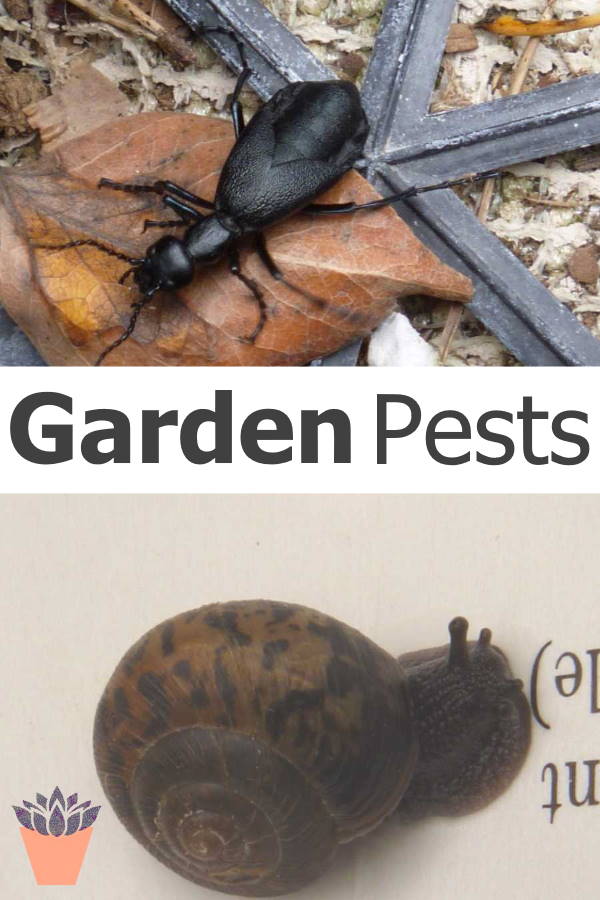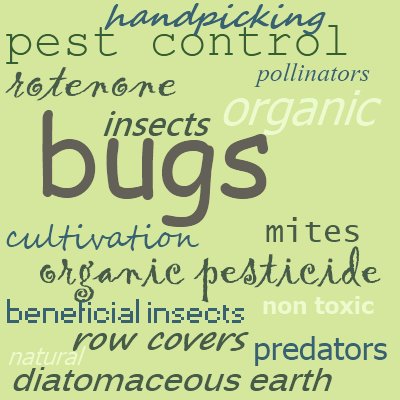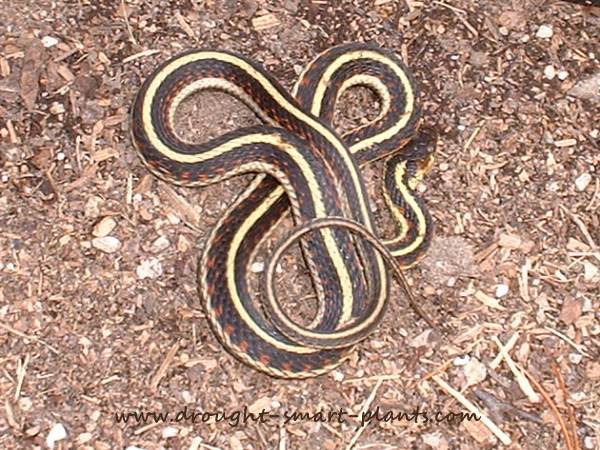Organic Pest Control in the Sustainable Garden
Garden pests can be defined as a group of damage-causing organisms specific to the garden setting such as certain insects, animals or bacteria and fungi.
Learn all about how to identify which ones are harmful, and which are beneficial with the Plant Pests E-Book.

Any creature that damages or eats plants will fit into this description. Garden pests may be as large as moose or deer, destroying fruit trees or shrubs while browsing the stems, or as minuscule as bacterial canker using a plant as a host.
Some techniques can reduce or control garden pests by mechanical means, such as fencing and mulching, or by baffling the senses of insects using tactics such as smell from garlic, onions or marigolds to deter them.
This is referred to as ‘companion planting’ with many plants benefiting from a close association with certain other plants.

Simply planting many different kinds of plants close together can confuse many garden pests, or diffuse the damage to plants by making it harder for the pest to find its preferred host plants among many other scents or colours.
Biodiversity is how nature protects plants and organisms, so using the same method in your garden will ensure that some of every kind of life form will survive even a drastic pest attack.
Attract beneficial insects with a nectar corridor and make your garden attractive to xeric garden birds to help with your pest control efforts.
Sustainable gardening methods such as increasing the organic matter in the soil with compost enables healthy plants to withstand damage from garden pests. Learn more about ways to utilize natural techniques with the Sustainable Gardening E-Book.
You will still see some garden pests at work, but the damage will be lessened by using some of these strategies to control garden pests.
Trying to find out what your bug is? Look through the Insect Encyclopedia.
Eliminating pests in your xeric garden organically will give you a considerable advantage over the gardeners that are still trying to grow beautiful gardens with pest management techniques from the dark ages.
The growing trend away from using chemical pesticides entirely means that those gardeners will be dragged kicking and screaming into growing organically.
In your garden, pests will be minimal due to your wise use of organic gardening methods to ensure you have a well balanced ecosystem.
This balance is crucial for limiting pests, as plants under stress send out alarm signals which attract pests to them. A weak plant is a target for hungry insects.
Pest Control Strategies
- You will be using soil building, composting and mulching techniques to eliminate stress in your plants, enabling them to easily shrug off pests. The addition of glacial rock dust to your compost or directly to the growing beds will increase the pest resistance of the plants.
- Beneficial insects, wildlife and birds will also be contributing to your pest management system.
- Your gardens will thrive with little to no irrigation due to your choices of plants with drought smart strategies.
- Use benign pesticides such as diatomaceous earth which have no effect on earthworms or other soft bodied organisms, but kill aphids and many other insect pests. Home made pest sprays are easy to make with common household ingredients.
Pests that you may encounter are sometimes the four legged kind – skunks, raccoons, deer, chipmunks, squirrels and cats. Here are some ways of dealing with the four legged types:
Fences:

- Fences work well for most critters that don’t climb, such as dogs, rabbits and so on. The cleanest fencing I’ve seen is black plastic netting which will hold out most animals as long as they have a route around it, but don’t try this if you have limited area for a detour as they’ll go right through it. The same risk exists if you have a trapped animal, such as a deer.
- Twig fences add a rustic feel to your garden, and if additional netting is used to prevent animals from pushing through the bottom of it, it makes a functional and beautiful accent to a country garden.
- Deer fencing is page wire, or woven wire with squares that range from 5cm to 20cm (3-8″). Most deer, elk and moose won’t jump over 1.75 meters (8′) high. They will shy away from anything that feels as though it will trap their legs, and they won’t jump anything if they can’t see the other side.
- I’ve also seen a fencing technique using two short fences about 1 to 2 meters (3-6′) apart which works well for deer, as they won’t jump where they feel there isn’t room to land. Even though they can easily jump up to 2 meters (10′) in height, these short fences work great and don’t make your garden look like a fortress. Use the area inside the two fences for a chicken run to keep the weeds down.
- Electric netting can deter unwanted visitors, as long as the fence is not touching grass or weeds which will ground it and prevent it from working effectively.
Trapping:
- Skunks and raccoons tend to be attracted to compost, so keeping it in a closed bin will eliminate most of their nocturnal visits.
- If you do happen to have one determined to get into your corn or other vegetables, a live trap works well, although it takes a certain skill and determination or desperation to capture a family of skunks.
In most cases, the mother skunk is teaching her babies how to forage, so some may get caught while others are left loose. This can be a bit traumatic as baby skunks can spray almost as well as adults!
- In some areas there are feral cats, or pets that have been abandoned. This can be a major problem. Although I feel sorry for them, I don’t want them in my xeric garden, leaving landmines and catching birds, and possibly carrying rabies or other contagious diseases and parasites. There is a product called Skoot which might work – this needs more research.
- Deer also hate the smell of carnivore blood, human hair, and rotten eggs. Some products are commercially available using these kinds of repellents, and vary in success rate. Deer seem to change their taste, and something that works at first loses it’s efficacy over time. These also need to be re-applied after rain, or if washed off with irrigation.
- Bears can be warned off by the use of human urine sprinkled on the boundaries of your xeric garden. This will only work if you eliminate all other attractants such as garbage, compost or fallen fruit.
Other Pest Control Tips:
- Chipmunks and squirrels are pests when you’re planting bulbs – don’t leave any of the papery wrappers on the top of the soil, as this attracts them. Chipmunks in particular are worst in the fall as they’re getting ready to hibernate, and will collect up food stocks to store for the winter. They do a lot of damage to succulent plants and any fruit left on trees, shrubs and vines. Sometimes you can protect your plants with rustic salvaged bird cages or make a cylinder out of hardware cloth to protect single plants or small groups.
- Squirrels dig holes to bury their pine cones and other winter food stores, sometimes digging under your plants in the process. Mulching with pebbles will deter them, or place larger rocks around plants that are at risk.
- Take planters with your precious tender succulent plants indoors as soon as the nights start getting chilly, and try and have some sacrificial plants that you don’t mind them decimating. Sedum is a plant that works well for this, as all they do is prune off the long growth, giving the plants a haircut before winter.
- Supplying a feeder with whole peanuts still in the shell can distract them from your garden. Put this in an area away from precious plants and they’ll usually abandon the plants in preference to the peanuts.
- Xeric gardens have few other pests, as it’s an inhospitable environment for the likes of slugs, which are a favorite food of garter snakes and many other reptiles. Did you know that venomous snakes are afraid of garter snakes? Who would have thought?
- If you see slugs and snails after a rain, or in an irrigated area, they can be trapped by putting a board down in the evening, and checking under it in the morning where the slugs will retreat to avoid the hot sun. You can dispose of them or move them, as you like.
- In some cases, there may be outbreaks of insects such as aphids. In a garden where the birds are welcome this will be rare, and is an indication of other factors. Aphids are farmed by ants, which milk them for the honeydew secreted as waste. Get rid of the ants, or convince them to move on, and the aphids will not be a problem. If you see tiny finches or other birds flitting about on the branches of shrubs and trees close by, this is sometimes what they’re after. Encourage the birds and spiders, and you’ll have fewer pests. Learn spider identification to determine which are helpful and beneficial (most of them are!).
- Caterpillars can leave unsightly chewed leaves on your favorite plants, but before you go on the war path, check to see what the larvae will turn into. Nothing can make you feel worse than finding out after you exterminate several large caterpillars on the dill plants that they would have transformed into swallowtail butterflies.
In some cases, as for tent caterpillars, action is required. If you don’t, they can spread many miles, completely defoliating whole forests. If this happens several years in a row, it can kill a seemingly healthy tree.
- I’m not a real proponent of Bacillus thuringiensis, which is a naturally occurring bacterium that kills caterpillars, as it also kills larvae of butterflies, too. Birds don’t like the taste of tent caterpillars, so it may be the only solution for infestations of them, other than cutting off the affected branches and burning them. This bacillus is similar to that used to kill mosquito larvae in ponds, which is harmless to pets and fish, although it seems to cause damage to our other friends, dragonflies, with deformations of the wings when the larvae hatch out into adults.
- If you’re unlucky enough to garden in an area that has ticks, one solution is to get guinea hens. Letting guinea fowl free range in your garden will completely rid the area of ticks. That’s a win-win situation.
- In the same vein, a small flock of chickens or ducks can take care of a wide array of pests. Just protect areas that you don’t want to be scratched up with a short fence or a tunnel with a row cover to keep the chickens out. Ducks don’t do too much damage to established plants but are quite partial to young lettuce.

Keeping your plants well fed with compost, and regular patrols to determine which natural controls are already taking place will eliminate a lot of work for you.
Let Mother Nature help you while you support your garden to become a well balanced microcosm.
Accept some damage from pests, and you’ll be providing a food source for beneficial insects, birds and other wildlife.
Watching the interplay of all the many creatures in your xeric garden will fascinate and amaze you in your journey of discovery.

